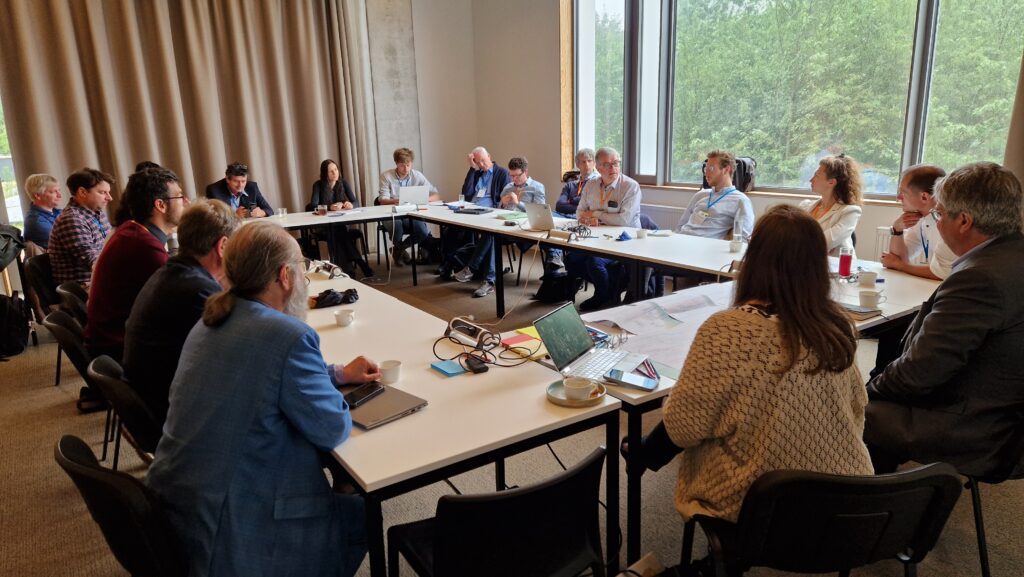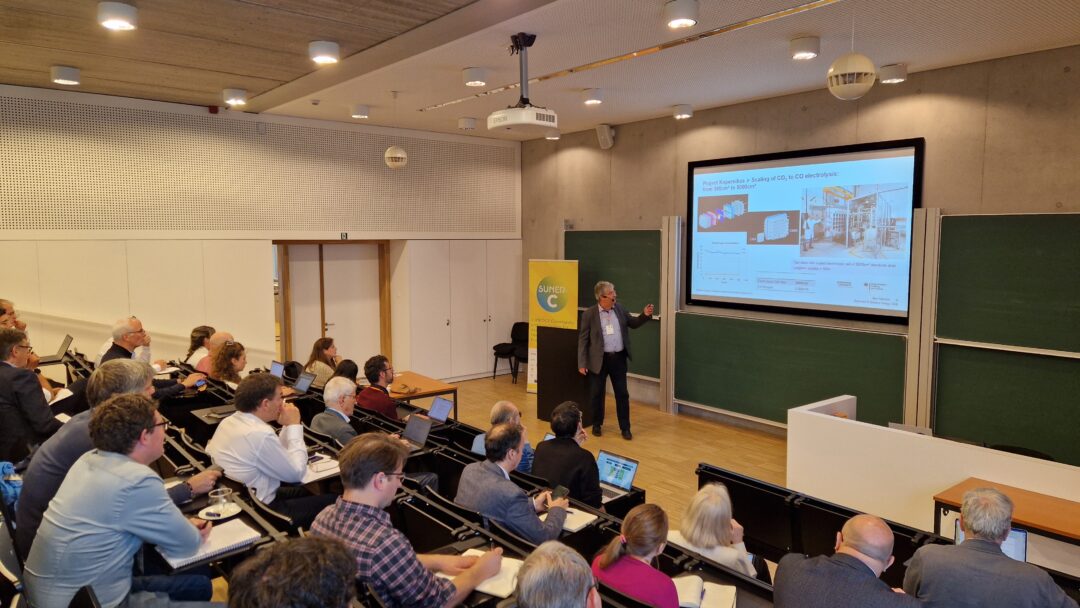The SUNER-C workshop titled: “Towards an Innovation Ecosystem for Solar Fuels and Chemicals in Europe”, brought together more than 75 industry experts, EU policymakers and academic researchers at the Science Park of Ghent University on July 2-3, 2024.
This two-day event addressed the integration and advancement of solar fuels and chemicals, through stakeholder pitches, breakout working sessions, policy presentations and a visit to the ArcelorMittal Steelanol plant.
The workshop’s primary objectives were to identify and discuss industry priorities, needs, and potential contributions to the value chains of solar fuels and chemicals in Europe. The event also aimed to propose new business models, consolidate the innovation ecosystem and pave the way for the future of the SUNERGY initiative beyond the SUNER-C project.
Day 1: Setting the stage for innovation
The workshop kicked off with an introduction by the SUNER-C coordinator, Bert Weckhuysen from Utrecht University, followed by an opening lecture by Max Fleischer from Siemens Energy. Their presentations highlighted the critical role of solar fuels and chemicals in decarbonizing industries and enhancing EU competitiveness, and introduced the concept of a “refinery of the future” in which small, abundant moelcules (instead of fossil intrants) would be transformed into chemicals and fuels using renewable energy sources.
During stakeholder pitches, 15 actors from academia and industry showcased their research or sector innovations. The first round included presentations by Babette Pettersen from LanzaTech, Pau Farràs from University of Galway, Christoph Falter from Synhelion, Janne Wallenius from SolarFoods, Marc Borghans from ING, as well as Han Huynh and Laurent Baraton from ENGIE. After a brief coffee break, the afternoon resumed with Hannah Johnson from Toyota Motor Europe, Ivan Souček from the Association of Chemical Industry of Czech Republic (SCHP CR), and Vincent Artero from CEA. These sessions were moderated by SUNER-C co-coordinator Frédéric Chandezon.
In thematic breakout sessions participants focussed on three key topics: financial de-risking; business model development; and centralized vs decentralized applications.

To conclude the first day, Sophie Loots from Energy Cooperative ZuidtrAnt took the floor to provide insights about the ‘H2 coop storage project’. Before the networking dinner, MyLeaf, the photovoltaic water electrolysis system brought from Leiden University, demonstrated standalone solar water splitting at the outside of the event building.
Day 2: Deepening the discussion & ArcelorMittal Steelanol plant visit
The second day began with an opening by Anouschka Versleijen from Leiden University/Luris, who introduced the following stakeholder pitches: Eline van Berlo from SkyNRG, Esther Santos from Apria Systems, Joost Smits from Shell, Ludo Diels from VITO, Max Fleischer from Siemens Energy, and Fredericq Peigneux form Heidelberg Materials.
The breakout sessions continued, building on the progress from the previous day. Afterwards, participants reconvened in the main auditorium where summaries of these sessions were presented by Arne Roth from Fraunhofer IGB, Ann Magnuson from Uppsala University, Max Fleischer from Siemens Energy, and Athanasios Konstandopoulos from SyNest.
A policy session followed, moderated by Elena Guarneri from SUNERGY, featuring contributions from Philippe Schild from the European Commission’s DG RTD, – who covered R&I strategy and priorities on solar-to-X -, and Algreit Dume from DG GROW, on the transition pathways for the European chemical industry. Huub de Groot from Leiden University delivered the closing remarks, emphasizing collaborative efforts and stressing the ongoing need for dialogue and innovation in this critical sector.
Participants then visited one of the highlights of the workshop: the ArcelorMittal Steelanol plant, where they witnessed firsthand the integration of innovative technologies in industrial settings. This site visit underscored the practical applications and potential of sustainable fuels and chemicals in driving sustainable industrial processes.
Over this two-day event, participants had the opportunity to consider the challenges and opportunities that come with the perspective of re-evaluating the way that our societies produce and consume the chemicals and fuels needed for its functioning. From the visionary presentations which explored what our distant future could look like, to a visit of a pilot plant that gives us a glimpse of that future and through the down-to earth considerations explored in breakout sessions, this workshop gathered a wide diversity of stakeholders and is already furthering discussions on how to enact a just and sustainable transition away from fossil fuels as energy sources.

